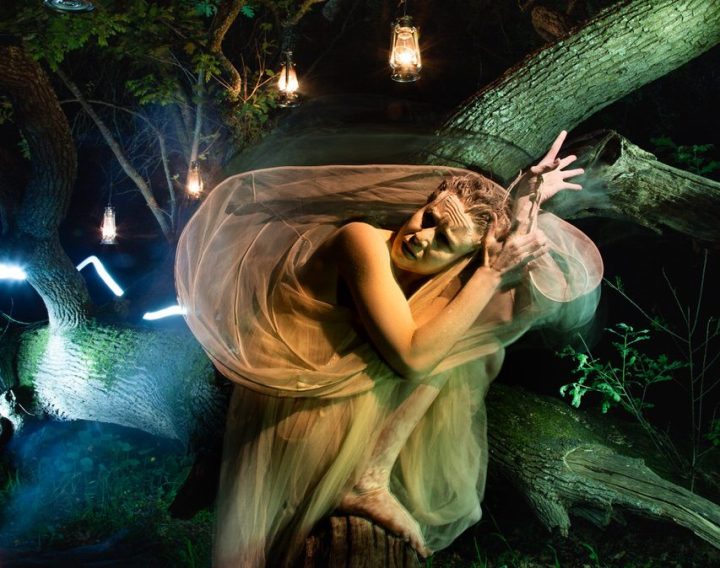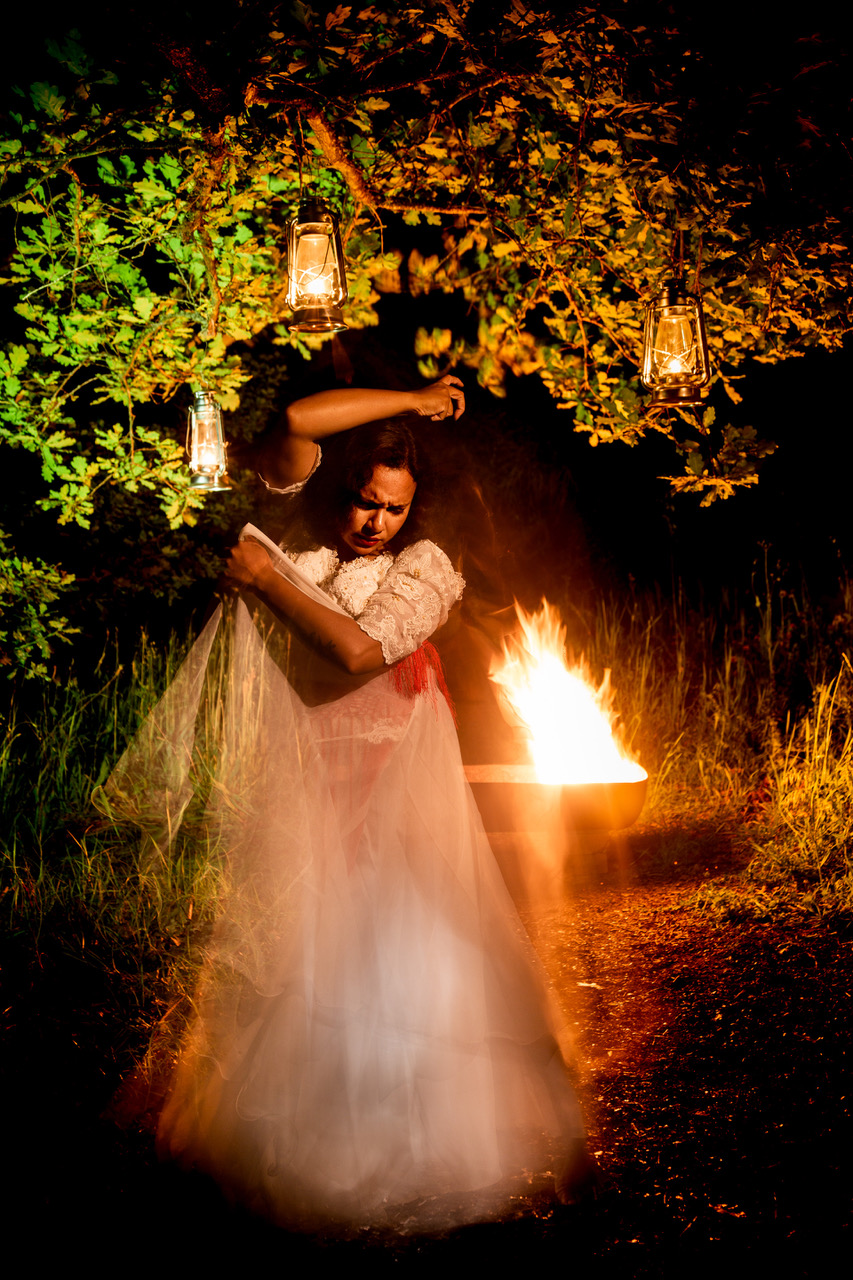MATTERS OF OBSESSION
Brett Bailey’s ‘Constellations’ is not what you expect

The power of Bailey’s startling, head-scratching event is that it does not attempt to say anything, it does not assume to be anything. He created four pockets of time, stitched together by short walks along dusty paths.
A woman in a forest, her “stage” a small clearing delineated by the bulk of a large fallen tree. She wore a cerise chiffon dress, the sort you’d imagine being used for playing dress-up, maybe a little girl trying on her mother’s AfrikaBurn outfit. On her feet, a pair of snakeskin boots.
Her face – expressionless, a clean slate, devoid of emotion or meaning – suggested a deep, faraway focus; she was absorbed in some unknown intrigue, perhaps her mental preparation for what was about to unfold. Or perhaps she had already hooked into a different realm.
For us, the audience – a roving band of a dozen or so spectators – there was the anticipation, the angst and foreboding as we silently speculated about what we were about to watch.
Once we’d taken our seats, a half-moon of tree stumps on the ground, she began: some sort of interaction, perhaps a kind of dance, with the fallen tree. Or maybe it was something more intimate being suggested by the manner in which she groped and gripped the trunk, and held her legs tightly around its bulk.
Certainly, some sort of relationship existed between this actress, Mandri Sutherland, and the tree. Unclear is whether it was perhaps erotic, or something more akin to mourning for the fallen tree. Could it have been an environmental protest? Or maybe an enactment of childhood play – her climbing and clambering, her tree-trunk exploring.
Was this woman an archetype, perhaps a character from a fairy tale or fantasy? According to the parameters of the evening’s performance, she was a “Guardian of the forest”, one of nine women involved in Brett Bailey’s third iteration of what he calls Constellations, a now-annual performance project begun during lockdown, providing a platform for artists to express themselves by whatever means they choose.
As observers, there were no questions asked of us, no task at hand. There was no expectation to try to figure it out. And there was nothing to imply a narrative strand.
Perhaps what we were witnessing was about the body itself, its physicality, its visceral quality. And there was the occasional violence with which her body made contact with the tree, all that slamming of flesh against wood. Not to mention the rough handling of the branches, the coarse texture of the bark, the sharp bits of wood poking out of the trunk, the tips so very close to her eyes, jutting out threateningly towards her flesh.
Just as worrying: splinters.
The performance, though, seemed to want to resist meaning. It was a kind of anti-narrative, less a story being told than an enactment of some creative impulse. Or some physical endeavour.
When it ended, there was no applause, no recognition, only a drumbeat and a series of whistle blasts and the turning on of torches signalling us to get up and move on, time to head to the next 20-minute performance in another clearing in the forest, not too far away.
Expectation can be a powerful force, but it can also get in the way, hampering the opportunity to really be in the moment.
How very different, the texture, tone and emotional resonance of the space watched over by the next woman… This time, what we witnessed was musical in nature, the genre unspecified. Musician and ethnomusicologist Ncebakazi Mnukwana played a traditional single-string instrument, something akin to an uhadi bow with its calabash resonating chamber, which produced a twangy, primordial sound that seemed to emanate from the deep distance of time, its rhythm trancelike, like a meditation.
Certainly, the setting, the darkness of the woods, the sounds of the night, added to this sense of ancientness. And when she switched to playing the mbira, she also sang with a voice so stirring and beautiful I could have listened to it forever.
In this performance, not only did Mnukwana greet us with smiles and her warm eyes, but we were addressed directly so there was no fourth wall, no pretending there was a stage separating performer from spectators.
We were given little paper cards, each inscribed with a syllable, a phrase to be spoken or sung, and when – at Mnukwana’s request – we sang these tiny verbal fragments, it turned out that we, the audience, became part of the soundtrack and the energy, too.
Some of us battled to get the short phrase right, some people seized up or refused to sing, outright ignored the request to participate. There were looks of minor confusion, even irritation, from people in our audience group, unsure what was happening, uncertain why they were being roped in. This was evidently not what they’d expected. This was not what they came to the forest for, not what they’d arrived at Spier to see.
Expectation can be a powerful force, but it can also get in the way, hampering the opportunity to really be in the moment.
Bailey, the creator of some of the most important theatre work to have been created in South Africa in the past 20 years, is explicitly nonconformist. He keeps himself free from the influence of mainstream entertainment, remains innocent of what most of us would consider popular performance. He is an ideas man, always searching for newness.
What he has created, here in this forest on an island between the Eerste and Blouklip rivers at Spier, is a kind of ritual of witnessing, an attempt to wipe the slate of expectation clean and get paying audiences to stretch their window of experience, to step outside of their comfort zones, to engage with unexpected modes of expression, acts by artists that are not necessarily defined by any specific norms, genre or style.
We were halfway in, and whatever expectations any of us might have had, had been upended. Agency resided fully with the Guardians, with the women charged with holding space, doing what they felt compelled to do.
The third performance was also musical, an improvised balladeering in the style of a folk singer riffing on themes relating to the preservation of the planet at a time of ecological dire straits. At least that is what I took from it. Around me, I am sure there were at least a dozen diverse interpretations of what modern-day bard California Janson was channelling through her doe-eye crooning. There were rhyming couplets, some successful, some less so, and there was her repetitive strumming of the guitar.
And there was a sense that the words were emanating from an unknowable place, uttered into existence through some personal interface between the artist and something unseen, so that her singing took on almost mystical resonance.

Flamenco dancer Ché Adams in ‘Constellations’ at Spier. Image: Nick Aldridge
The fourth and final segment of the evening was the most physical: a flamenco dancer, Ché Adams, in a white dress, barefooted in the dust under a large tree.
Out of her came a dance that seemed to erupt like a volcano; first a few dainty foot taps on the ground and then, once she’d stepped into high-heel shoes, her tapping grew into powerful stomping. Fearsome energy emanated from her as she slammed her feet against the two wooden boards laid out as a kind of makeshift stage, accompanied by clicks of her fingers that seemed to punctuate her footwork.
Bailey’s concept for the “women in the forest” themes came from a visit to a forest in Benin where a group of women live and are venerated and held in awe and esteem for the power they possess.
Her raw emotional intensity was captivating, for sure, but was it anger, passion, freedom or something else being expressed? I guess one tended to project one’s own mood onto the blank canvas of energy that pulsed out of her.
I doubt Brett Bailey is greatly interested in entertaining audiences so much as opening people up to experience, exposing us to the endless possibilities that every individual represents. Each 20-minute segment of this particular strand of Constellations seemed an intimate, deeply personal window, a chance to observe the artistry of a woman doing her thing, expressing her impulses, tapping into her creative source.
Bailey says his concept for the “women in the forest” themes came from a visit to a forest in Benin where a group of women live and are venerated and held in awe and esteem for the power they possess.
I tried to imagine what this power might be, what force is exerted by women who dwell in a forest and are left to be who they wish to be, to do what they want to do. I presume that their power is freedom: they possess the freedom to live their creativity completely, to fully express their sense of self. Surely that is fuel for a kind of power that we might all be capable of, were we free of social and political constraint rather than mired in expectation.
The power of Bailey’s startling, head-scratching event is that it does not attempt to say anything, it does not assume to be anything. It is simply women in a forest holding space. And holding an audience’s attention for 80 minutes; four pockets of time, stitched together by short walks along dusty paths.
At the end of the night, everyone – a long train of spectators – walked by torchlight back to where we’d started. It was quite a hike back to the tamed and civilised part of Spier where the buildings and parking lots are, and where we spectators would discuss and dissect, critique and compare notes as we returned to our respective comfort zones.
The forest at night had been a primordial space, no doubt chosen to provoke some degree of trepidation, to remove us from familiar circumstances. Symbolically and physically, the walk back at the end of the night was really a return from the wilderness.
My friend, who’d been split up from me for the performance, said she’d been a touch fearful at times, anxious about not knowing what to expect, slightly panicked that she’d been separated from me by the random allotment of audience groups. We’d been in a forest with strangers, grappling with the unknown, witnessing the unexpected.
We discussed how hard it can be to trust, to let go, to simply experience. And to refrain from judging the creativity and free expression of other people. Because it is ultimately not all that easy to go into a space without expectation. Nor to remain completely open to what others have to share with us.
But that is what Constellations asks of us. DM/ML
Constellations runs at Spier for two more nights, this Friday and Saturday, 18 and 19 November, at 6.30pm with arrival at 6pm. Tickets start at R200 per person and include a glass of wine on arrival. Advance booking via Webtickets is required.



















 Become an Insider
Become an Insider
Comments - Please login in order to comment.